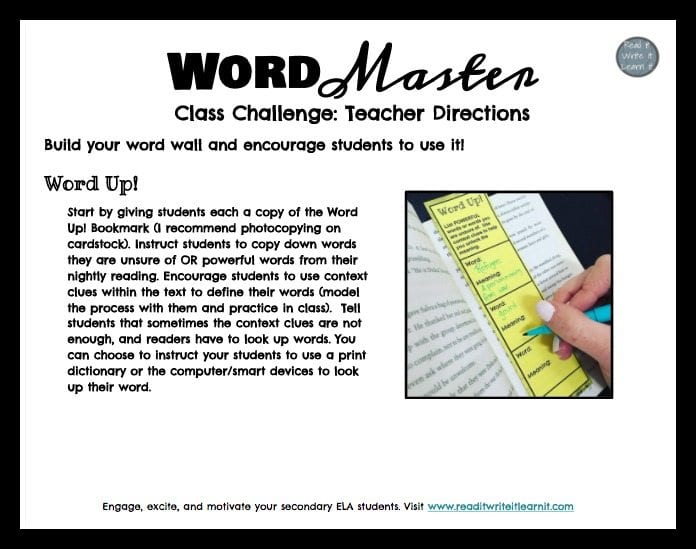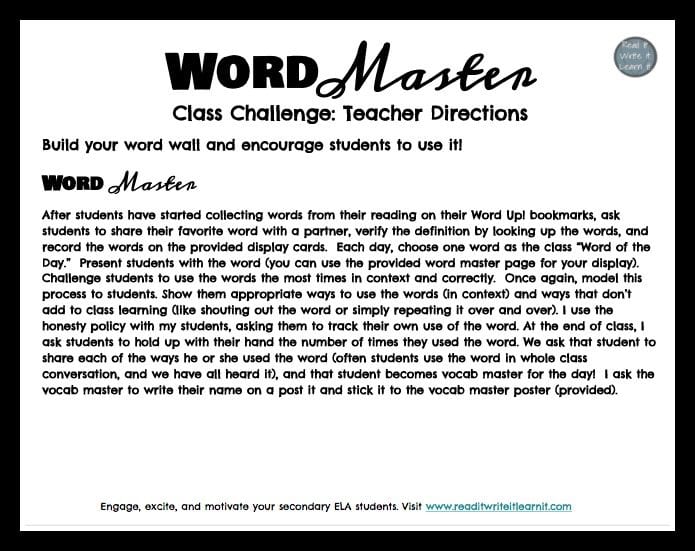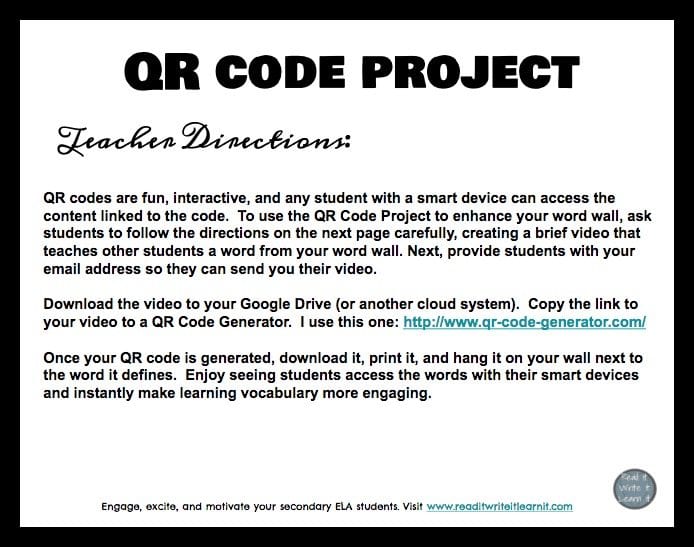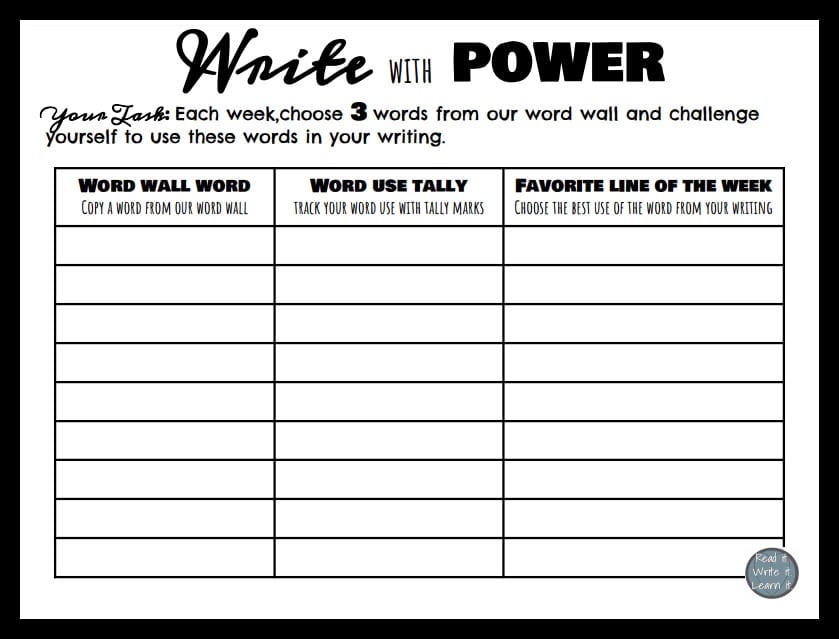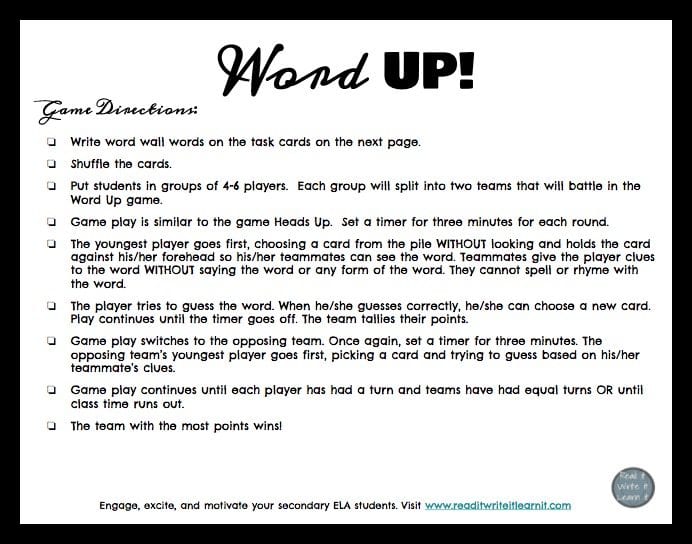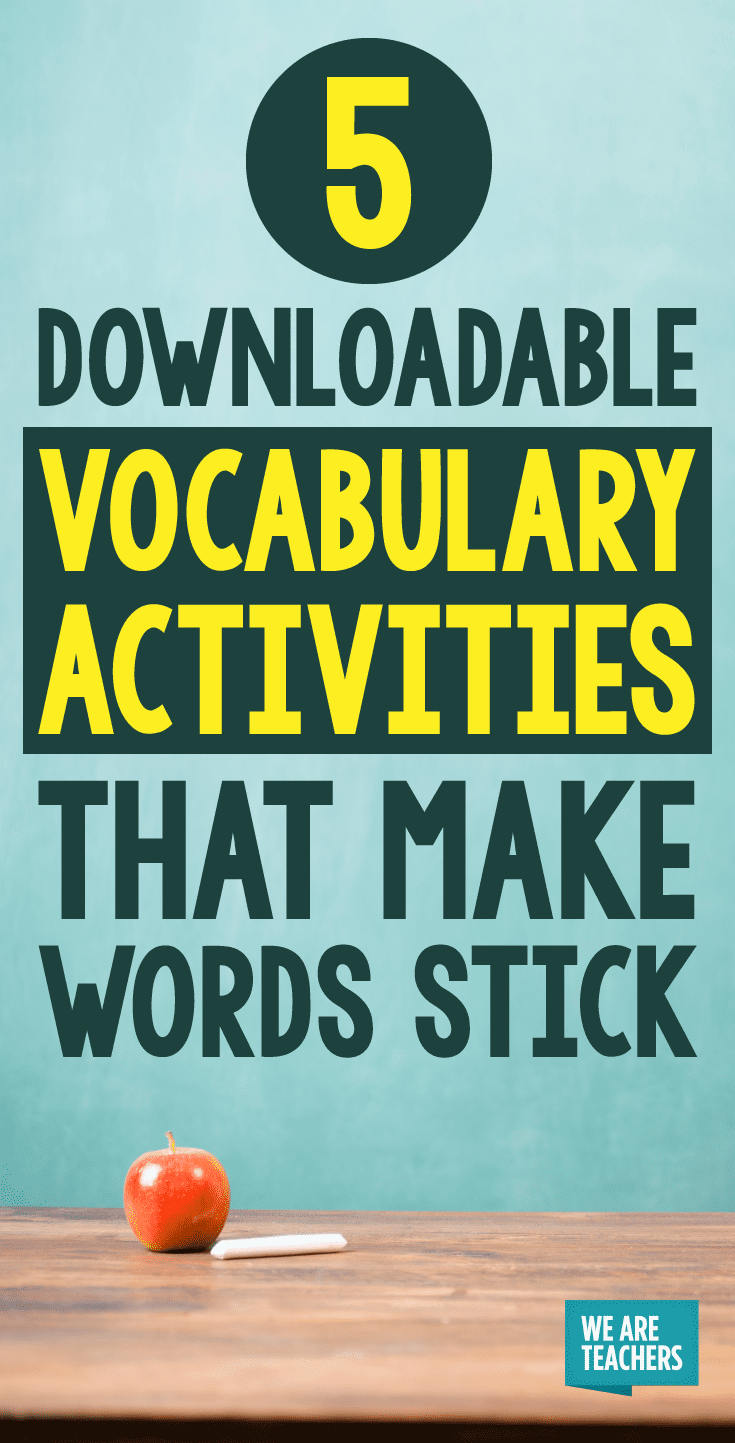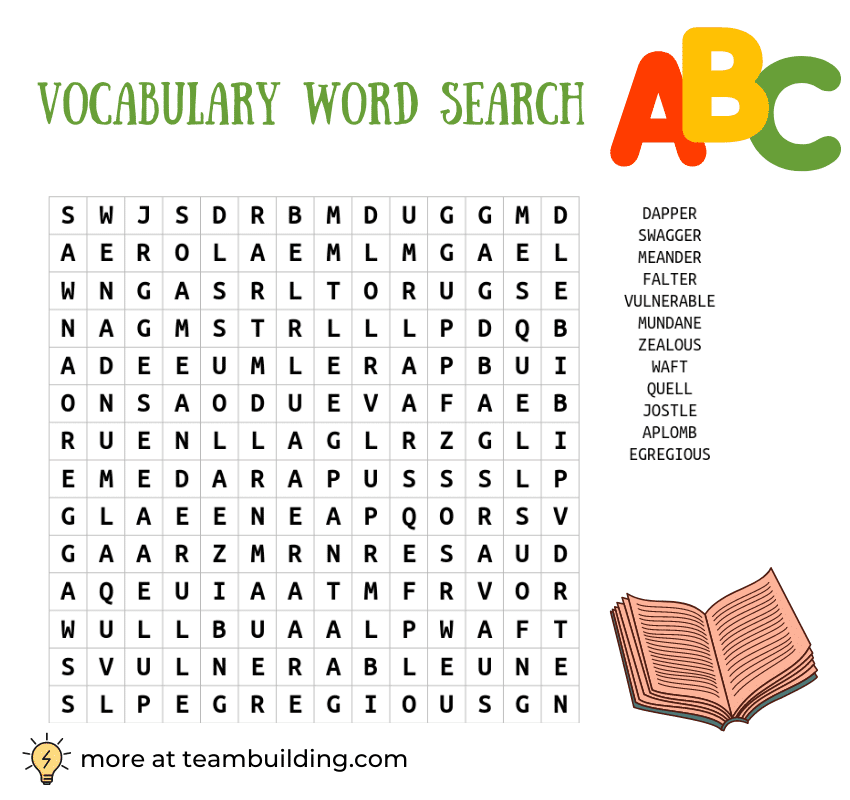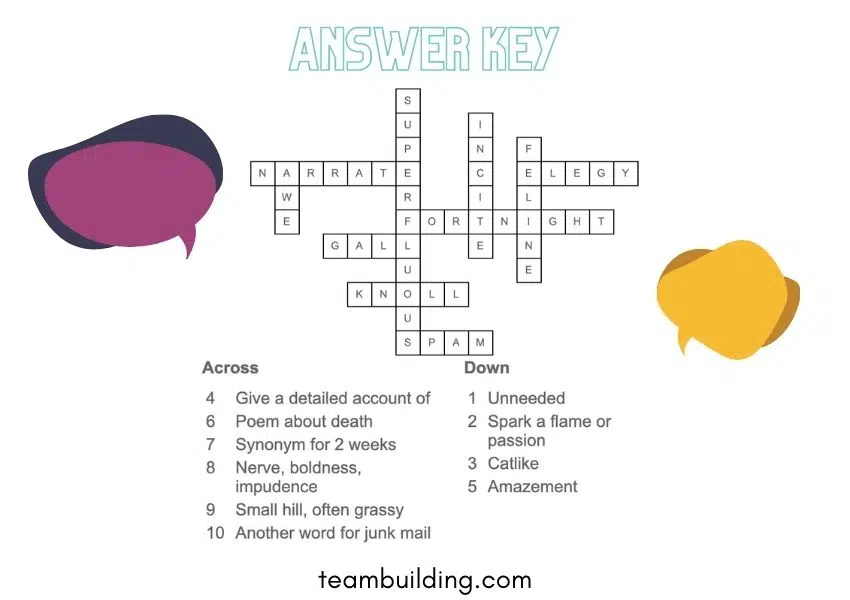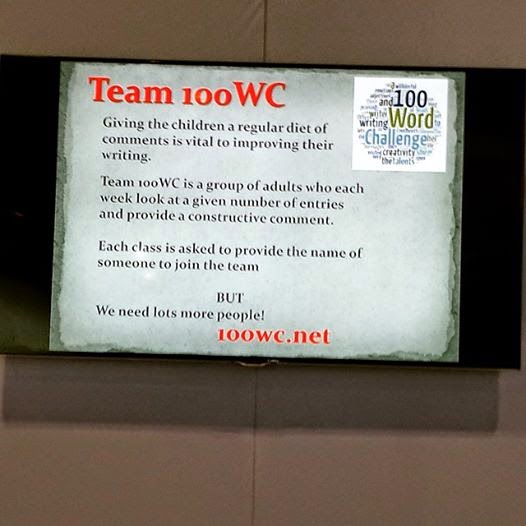I’ve had the pleasure of working with this company. All opinions are my own.
Have you tried a writing challenge with your students? I was so excited to have an opportunity to participate in a special word challenge with my friends at Adobe Education. It’s called a “200 Word Challenge” and it’s the perfect format for student writers. In this blog post, I’ll take you through the challenge resources, share a link to the video where I participate in the challenge, and hopefully inspire you to tailor this to your own classroom.
If you’re a regular reader of the blog, you know how much I love the Adobe Spark tools. Ben Forta and I even wrote a book called 40 Ways to Inject Creativity Into Your Classroom With Adobe Spark. This challenge isn’t one of our 40 activities, but I’m very excited to share it with you. And don’t forget, I do have a free download, it’s a set of graphic organizers you can use with the Spark tools.
Let’s jump into the writing challenge!
Challenge for Student Writers
The 200 word student writing challenge takes a spin on a traditional writing prompt. Instead of asking students to respond to one question, it has an overarching theme. The theme is broken down into four sub, or smaller, questions. Students can respond with their answers to the questions using about 50 words each.
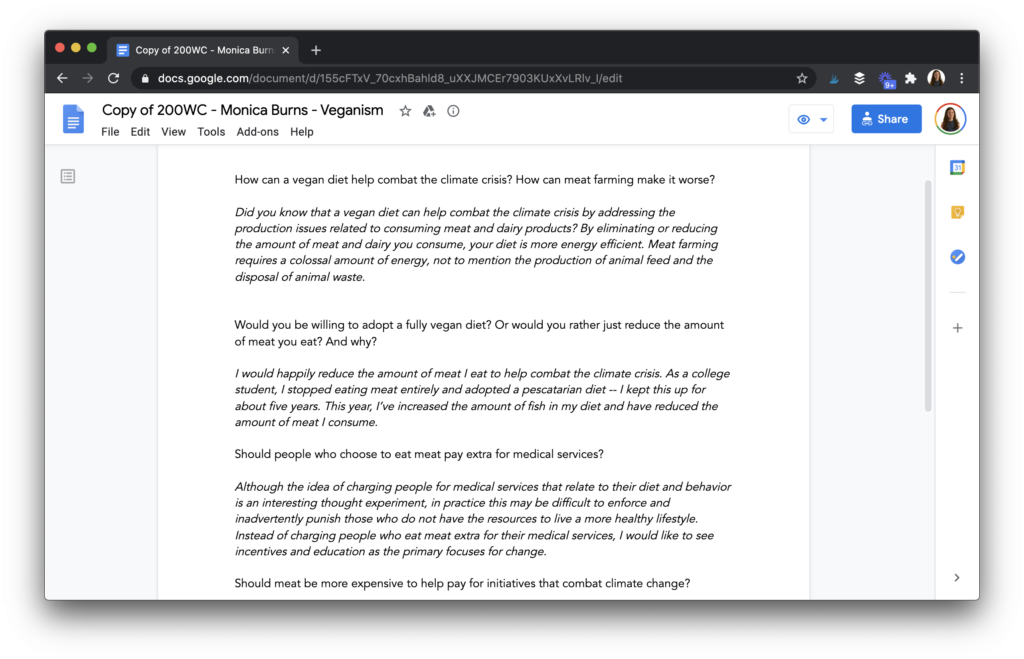
As you can see in the screenshot above, I answered the questions for my challenge on a Google document before jumping into Adobe Spark. Just like how you would create an example, or exemplar for your students, this is a great step to model. After students put in their responses to their questions, they may want to share with a partner for feedback.
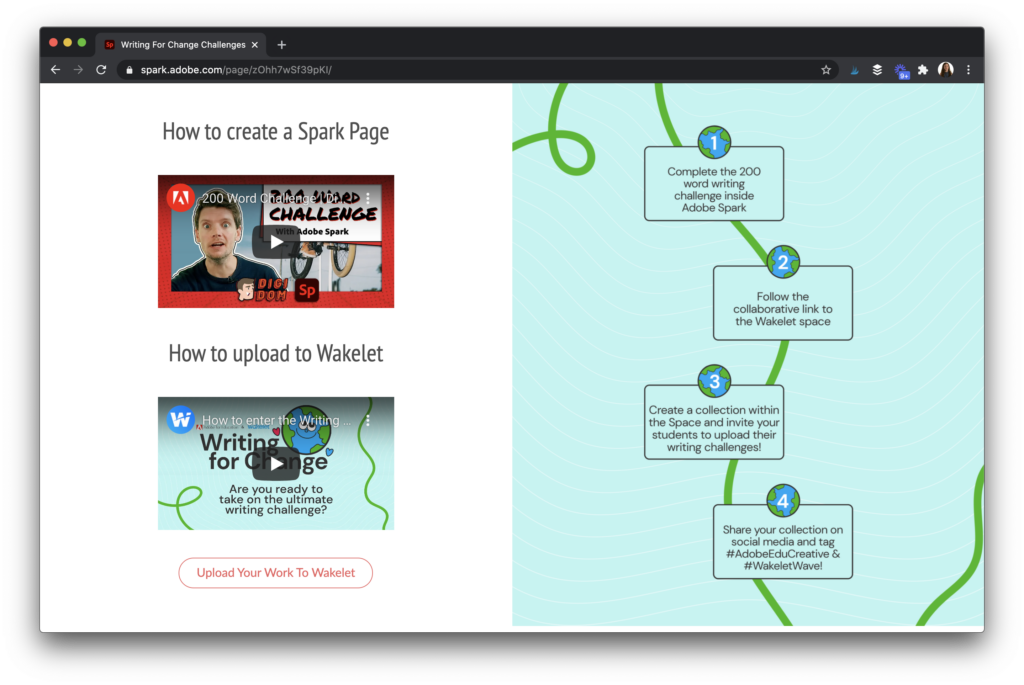
The challenge I’m sharing here in this blog post isn’t grade level specific. So it provides a great opportunity for you to examine your English Language Arts goals, or connect with an ELA teacher who may have certain skills they are working on with your students, if you are teaching a different subject area. You might decide to pull in a checklist, or rubric, or simply include this challenge alongside specific mini lessons already on your calendar.
Sharing Student Writing
After students have created their document with responses to the questions, it’s time to head over to Adobe Spark Page. Spark Page is the website creation tool that allows students to create beautiful landing pages. As you can see in the screenshot below, I am sharing examples from an Adobe Spark Page website in my Chrome Web browser. You can also use Adobe Spark Page on iOS,. The app for iPads and iPhones is very user-friendly, and students can login with the same email they might use on a Web browser.

If you haven’t set up Adobe Spark for your school, you have two options. This page shares details on district level implementation as well as how teachers can set up their class if you are a G Suite school.
Once students have opened up their Spark Page, they can build out their website from top to bottom. At the top of the screen there’s a space to add a title and header image.
Then the plus sign that follows as students scroll down the page allows them to combine text, images, links, and more. To get an idea of what this project looks like in action, check out this video recording of my session with Tanya Avrith and Dominic Traynor. We go through the steps together for creating a Spark Page with my example for the challenge.
200 Word Challenge
Although you are welcome to come up with your own writing prompts and ideas, the team at Adobe Education and Wakelet have you covered. This page goes through lots of ideas for getting kids talking about big issues. As I mentioned above, you might only focus on specific goals you have for students in English Language Arts or integrate another content area.
I can’t wait to see what your students create! If you decide to share on social media, make sure to tag my account @classtechtips as well as @adobeforedu. You can also add the hashtags #AdobeEduCreative and #WakeletWave for this challenge. This way students can connect with other kids in different parts of the world!
Each group tries to complete the English word challenge you give them by writing words that fulfill the requirements you set. For example — Six words ending in «e».
Basic Info
| Time: | 10 — 20 minutes |
|---|---|
| Level: | Junior high grade 1 — 3 (see warnings) |
| Works with: | Writing practice, spelling |
| Class size: | Medium to large |
You will need:
- Cardboard (for challenge cards)
- Challenge ideas
- Blackboard/whiteboard
Preparation
- Cut cards into hand sized squares, or about that size.
- Create a list of challenges. (See below for examples)
- Write the challenges on the cards. You may want to do it in Japanese (or ask the JTE to do it for you). If in Japanese, you may also want to write it in English (possibly for yourself).
Lesson Description
- Students get into groups.
- The first student from each group comes and gets a card from you. To make it easy, have one pile for each group, challenges shuffled.
- Students then take turns coming to the blackboard and writing the words needed to complete the challenge. One word per student. (Don’t want to use the blackboard? See variations below.)
- When the group has completed the challenge, they bring the card back to you. You check their answers and give them the card to take to the JTE, who then awards points to each team for 1st, 2nd, etc.
Tips
- Examples of challenges may include:
- Write five days of the week.
- Write in letters five numbers between 10 and 20.
- Write seven words ending in «y».
- Write ten words starting with «c».
- Write five words ending in «e».
- Write ten words playing shiritori. The first word must start with «g».
- Help out slower teams or slower students.
- Let teams help the writer, if you want.
Variations
- For a stronger class you could try writing the challenges in English.
- Instead of writing on the blackboard, student could write on paper, but this may mean weaker students get left out a bit more. Coming to the board means all students have to write. However, making the students pass the pen for each completed challenge solves this.
Warnings
- First graders may not be confident writing yet so save this game till later in the year.
I’m ALL about activities that require basically nothing in the way of materials or preparation time. It’s ideal to have at least a few of them in your back pocket to pull out in case of emergency, namely a last minute class thrown at you a few minutes before it starts. This ESL spelling game is one such example.
Spelling, I know. In the days of auto-correct on all our computers, do our students really need to practice this? I would certainly argue that they do. There are many cases where students have to write in English without the aid of a computer or cellphone. For example, in the written portions of English proficiency tests. It’s for this reason that I like to practice spelling in my ESL/EFL classes.
ESL Spelling Game
Skills: Listening/writing
Time: 10 minutes
Level: Beginner
Spelling is an oft-neglected skill in many ESL classrooms. However, it actually is quite important and worth spending some class time on. If you want to work on spelling with your students, try out this fun game. It’s also ideal for working on listening skills.
The way it works is that you divide the class up into two teams. One student from each team comes to the whiteboard and is given a marker.
Say a word and the two students have to race to spell it correctly. The first student to do this gets a point for their team. Continue with different words until all students have had a chance to play.
If you have a minute or two, make a list of words beforehand. If you’re using an ESL textbook, flip back to the units you’ve covered and it’ll take no time at all. Or, you can think of words off the top of your head. For beginners, things like numbers, animals, colors, days of the week or months of the year work well.
Procedure for ESL Spelling Practice:
- Divide the class into two teams.
- One student from each team comes up to the whiteboard and takes a marker.
- Say a word and each student has to write it on the board. The first student to do it correctly gets a point for their team.
- Continue until each student has had a chance to play 1-2 times.
Teaching Tips for Word Challenge
This ESL spelling game works better for smaller classes of 12 students or fewer because only two students are doing anything at any given time. More than that and it’s just not enough action for the majority of the class.
However, if you have lots of whiteboard space, you could consider playing with larger classes. Instead of having only two students write on the board, you could have 3 or 4.
Another factor to consider is whether or not you’ll allow students’ teammates to help them. In reality, it sometimes doesn’t help that much because if a student knows a word, they’ll write it in just a few seconds. It also creates some chaos. However, for small classes, it’s usually not a big issue.
Here are some more ESL spelling games to try out:
Did you Like this ESL Spelling Game?
Yes? Thought so. Then you’re going to love this book over on Amazon: English Teaching Emergency, No Textbook, No-Prep, No Materials ESL Activities and Games. It’s the ultimate source of teaching activities and games that you can use if you need something in a hurry. Seriously. You’ll love it.
The book is available in both digital and print formats. Consider keeping a physical copy with your attendance sheets and lesson plans if you regularly have to go into the classroom without having time to prepare. Or, download the e-version on your phone for the same purpose.
It really is that easy to have better English classes! Check out the book for yourself over on Amazon but only if you want a serious dose of ESL teaching awesome in your life:
Have your Say about Word Challenge
What do you think about this ESL spelling activity that you can do with your students? Did you try it out in class? Leave a comment below and let us know how it went. We’d love to hear from you.
Also be sure to give this article a share on Facebook, Pinterest, or Twitter. It’ll help other busy teachers, like yourself find this useful resource for ESL spelling.
ESL Spelling Game: Word Challenge
Last update on 2022-07-17 / Affiliate links / Images from Amazon Product Advertising API
 Brilliant Activities To Practise Vocabulary in Language Lessons
Brilliant Activities To Practise Vocabulary in Language Lessons
It is important to encourage students’ vocabulary development so that they have the necessary lexis available to them to succeed in communicating and understanding any language. This can be incorporated into most lessons through subtle vocabulary learning activities. This includes actively teaching vocabulary, absorbing words, picking up one or two words and trying to use them each lesson etc.
How can you teach vocabulary in the classroom?
One way of implementing this strategy in the language classroom is to incorporate a number of opportunities for students to reflect on words they already know, have exposure to words they should know, as well as have the opportunity to use and recycle this vocabulary in ‘authentic’ conversations and interactions. Below, you will find a number of fun vocab activities for language teachers to teach vocabulary with the sole purpose of aiding language learners to improve vocabulary learning.
Ways To Practise Vocabulary
Vocabulary activities are a brilliant way to get students focused in the language classroom and showcase their knowledge. In addition, these fun vocab activities also allow learners to acquire even more knowledge from their peers. Students will have the ability to reflect on what they know if they work individually. However, if they work in pairs and in small groups, they will also learn new words. Combining this reflection, as well as exposure to new words regularly, along with recycling this vocabulary in classroom activities and homework will aid language learners to have more vocabulary to communicate.
The purpose of this post is to collate a variety of fun vocabulary challenges that you can easily use in your language classrooms, at any time of the academic year. The vocabulary development activities are perfect for the French, German and Spanish Key Stage 3, 4 and 5 classrooms in England, but also ideal for English Language Teaching classrooms, as well as any other language teaching classroom anywhere in the world for all language learners!
Try the fun vocabulary challenges and vocabulary activities for revision below today. Which ways to practise vocabulary do you use in your language classrooms? Please feel free to add any ones that we should be using in our language lessons in the comment section below!
AWESOME VOCABULARY ACTIVITIES AND WAYS TO PRACTISE VOCABULARY IN THE LANGUAGE CLASSROOM
 1. How many words can you write with ‘two’ vowels?
1. How many words can you write with ‘two’ vowels?
Add a challenge to your vocabulary practice activities in your language lessons. This fun vocab activity could be easily adapted for all of your classes and it could be used regularly, but with some adaptations to keep things fresh. For example, change the ‘two vowels’ to ‘three vowels’, or the ‘vowels’ to ‘syllables’ etc. You can make the activities topic related or lexical, i.e. nouns, adjectives, verbs etc.
 2. Words Beginning with ‘X’
2. Words Beginning with ‘X’
How many words can you write down beginning with any letter of the alphabet? To make this vocabulary challenge topic-related, add a theme that the students must stick to, i.e. Food & Drink or Holidays. Timed vocabulary activities can often be the most fun, as students have a sense of competition and often enjoy trying to compete against their peers. Sometimes, I get students to compete with each other to see who has the most vocabulary that no-one else in the lesson has written down. A little treat always helps for the winner!
3. A-Z Vocabulary Practice Activity
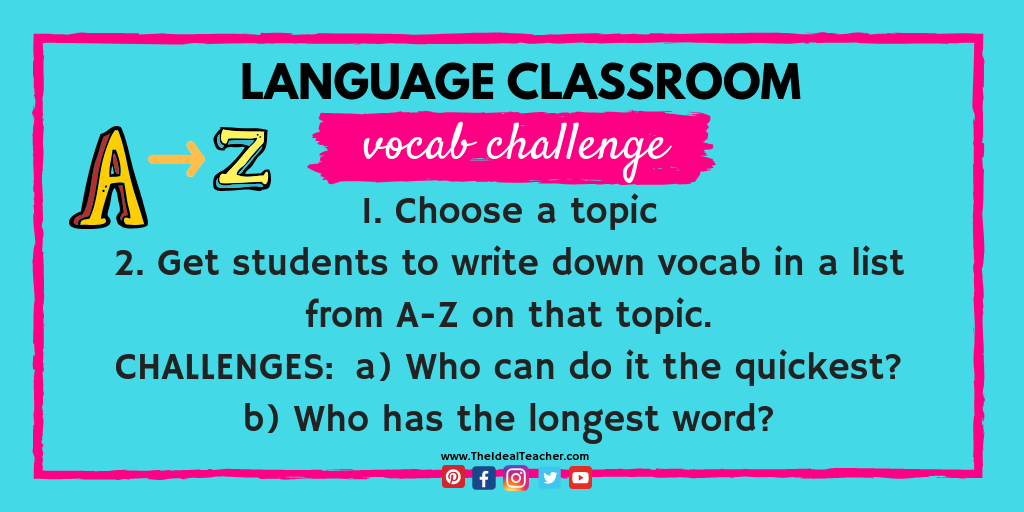
4. What am I thinking?
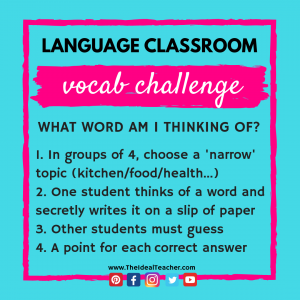
5. Beat The Teacher
This vocabulary practice activity is an oldie but a goody. It can be used to develop vocabulary and pronunciation for all students. This is one version of ‘beat the teacher’ with a competitive element but there are also many variations of it.
Create a PPT slide with imagery of vocabulary items in a grid. The students and teacher start off with 10 points. Point to an image on the grid and say it in the target language. If you say the word that represents the image correctly, then the students must repeat it. If you say a different word, or pronounce it incorrectly, then students must remain quiet. If anyone repeats the wrong word, then the teacher gets a point, if all students stay silent the class gets a point.
Tip: Get a reliable student to keep a tally chart of the marks. To decide on a winner, you could set a time limit, or the first ‘team’ to get to a certain number of points. If the class wins, you could let them out a minute early, or give them another type of prize.
I find this kind of vocabulary practice activity works really well to get whole groups engaged and it’s an excellent way of drilling with a competitive edge.
6. Word Association for Vocabulary Learning
I tried this creative vocabulary challenge out today with my English students and they loved it! The students got extremely inventive with the vocabulary that popped into their heads, in association with the previous one. You can use this as a stand-alone activity to get learners thinking of words they know. However, you could also combine it with a writing or speaking activity, too.
Instructions:
1. Teacher says a word, i.e. ‘facile’ and adds to whiteboard
2. Students must say the first related word they think of, i.e. ‘anglais’
3. Repeat until you get bored!
This vocabulary builder was used as a starter to a creative writing activity. So, if you have time, give the students a sentence starter, such as: ‘It was the first time that I was in a new country, when suddenly someone tapped me on the back…’ You can choose a sentence starter that fits with your class and their level. However, this worked so well and really got my students writing spontaneously but creatively at the same time. Win-win I’d say!
7. Hangman To Teach Vocabulary
When you think of fun vocab activities, then this might seem like a really simple and ill-thought out vocabulary challenge. However, try it out. It’s a brilliant idea and gets students so motivated. You can play as a whole class, perhaps as a plenary, or you can put students into small groups with mini whiteboards to compete against each other in small teams. If you are unsure on how to play hangman, check out the rules in the link.
Instructions:
- Choose the theme
- Put students into small teams with one mini whiteboard, pen and rubber
- Students choose who begins, and then go clockwise.
- Students compete against each other in the small teams
- Keep a tally-chart and get the winners from each team to compete for an overall winner. This might seem like a really simple and ill-thought out vocabulary challenge. However, try it out. It’s a brilliant idea and gets students so motivated. You can play as a whole class, perhaps as a plenary, or you can put students into small groups with mini whiteboards to compete against each other in small teams. If you are unsure on how to play hangman, check out the rules in the link.
8. Pass It Forward Vocab Activity
 I do love a good vocabulary activity with a competitive element! This one’s got both of these combined.
I do love a good vocabulary activity with a competitive element! This one’s got both of these combined.
Resources required:
- magnetic whiteboard and 1 x magnet per group
- students in groups of 4-5 seated in rows facing the whiteboard
- 10-15 images per group, related to whichever topic you would like to focus on
Instructions on the Pass It Forward Vocabulary Challenge
1. Sit students in groups of 4-5 in seated rows of tables facing a whiteboard
2. Beforehand, print out 10-15 images related to whatever topic you like on the back table.
3. Describe something from one of the images, i.e. ‘das blaue Hemd’.
4. The person on the back table must choose correct image and pass it forward to the person nearest whiteboard to stick on the whiteboard.
5. First team to put it on correctly and sit down again wins.
NOTE: If others disagree as they are passing it forward, they can pass it back and try again. Also, you can get students to move one chair back after each round. Watch out though, this option can be hard to manage!
CHALLENGE, get a stronger student to read out words, phrases or sentences, instead of the teacher.
9. What am I talking about? for Vocabulary Learning
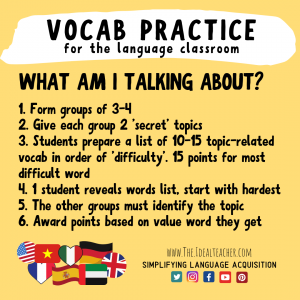
Instructions:
1. Put students into groups of 3-4
2. Give each group 2 ‘secret’ topics/themes that you have pre-prepared
3. Students work in their groups to prepare a list of 10-15 topic-related vocab in order of ‘difficulty’. The word they feel is most difficult, but relatd to the theme gets awarded 15 points, then 14, 13, 12 etc
4. After prep time, go around each group with a different student revealing a new word from the list each round, starting with hardest
5. The other groups must identify the topic, for every guess they make incorrectly, that team loses a point.
6. Award points based on value of the word the ‘winning’ team gets right
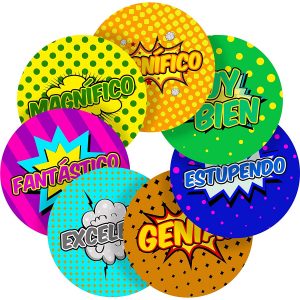
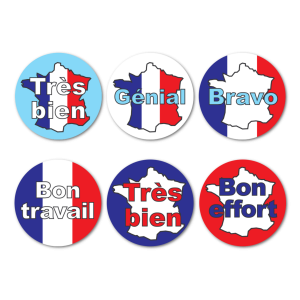
Spanish Reward Stickers
German Reward Stickers
Italian Reward Stickers
English Reward Stickers
10. Jumbled Words With A Twist
Resources Required:
TWO OPTIONS:
More Prep – Worksheet with scrambled words and clues
Low Prep – Get students to create their own individual ideas on post it notes or slips of paper + blue tack to stick them up after
Instructions:
- Whichever option you go for on this vocabulary revision activity, either you or the students have to produce a list of scrambled words related to your topic, or any vocab related to the course.
i.e. GAUR: _ _ _ _ - Alongside this scrambled word with space for the correctly spelled word next to it, add 1-3 clues in target language
For example, each jumbled word could be presented as follows:
GAUR: _ _ _ _
11. Lexical Lists for Vocabulary Learning Practice
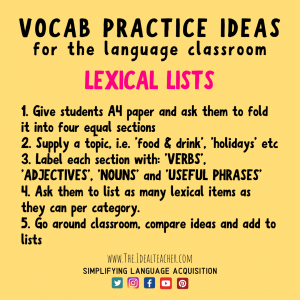
When To Use: anytime, but works well at the beginning of a topic to assess current knowledge (add to it as you go through a topic), as well as at the end as a revision activity.
Instructions:
1. Give students A4 paper to fold it into four equal sections
2. Supply a topic, i.e. ‘food & drink’, ‘holidays’ etc
3. Label each section with: ‘VERBS’, ‘ADJECTIVES’, ‘NOUNS’ and ‘USEFUL PHRASES’
4. Ask them to list as many lexical items as they can per category
5. Go around classroom, compare ideas and add to lists
It’s a no-prep vocabulary practice activity and really effective in revising vocabulary and sharing ideas! Not ideal to teach vocabulary though.
12. Word Acrostic to Teach Vocabulary
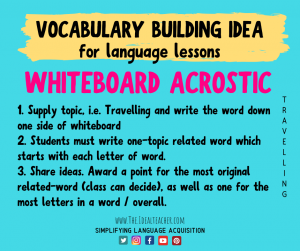
When To Use: anytime, but works well at the beginning of a topic to assess current knowledge (add to it as you go through a topic), as well as at the end as a revision activity.
Instructions:
1. Supply a topic, i.e. Travelling, Education, Health etc and write the word down one side of the whiteboard
2. Students must write one-topic related word which starts with each letter of the word on the whiteboard, i.e.
Trip
Ride
Aeroplane
Voyage
Excursion
Lake
Look
Indicate
Norway
Gallivant
3. Share ideas at end. Award a point for the most original related-word (class can decide), as well as one for the most letters in a word / overall.
It’s a no-prep vocabulary practice activity and really effective in revising vocabulary and sharing ideas!
13. 5 Words Vocabulary Practice Activity
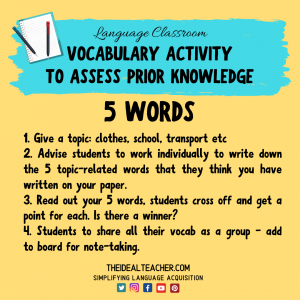
When To Use: Anytime. But, it works well at the beginning of a topic to assess prior knowledge, in the middle to assess learning, as well as at the end as a vocabulary revision activity.
Instructions:
1. Share a broad topic with learners (clothes, school or travel etc)
2. Explain you have 5 brilliant topic-related written words on your paper and they must try to guess the 5 you have by writing them on their paper.
3. Read out each of your 5 words and students cross out if they have them. Award a point for each correctly guessed and spelled word.
4. Students share their ideas and you can add these to the board under their lexical category for students to note down to add to their previously noted down topic-related vocabulary.
EXTENSION: Students can put each of their 5 words into a sentence underneath, once they have written 5 words they are happy with.
It’s a virtually no-prep vocabulary activity and extremely effective in revising vocabulary and sharing ideas and checking pronunciation and spelling too.
14. Just 3 Words
Vocabulary Practice Activity Resources Required: Exercise books, A6 strips of paper and pens
When To Use: This vocabulary activity is perfect for testing and practising vocabulary anytime during the year and it combines the skill of writing too.
Instructions:
1.Ask each member of the class to choose a broad topic from what you have learnt recently (i.e. food, clothes, school etc)
2. Put students into pairs and explain that their neighbour must write down three words, directly related to the topic you have chosen in list form.
3. The student must take the list and write a short story, dialogue or essay (45, 90 or 150 words) and they must include those three words and stay topic-related.
4. Once finished, get students to peer assess.
CHALLENGE ELEMENT: Give students a choice of grammatical challenges (use past simple, the third person singular or prepositional verbs) to incorporate too.
It’s a virtually no-prep vocabulary activity and extremely effective in helping students to be creative with a topic and vocabulary, with the help of just 3 words.
15. The Chain Vocabulary Game – Topic Related Word Revision Practice
A simple, no-prep vocabulary practice activity that is ideal for end of topic vocab revision. Remember those long car journeys you had as a kid? Where you had a topic, like: ‘COUNTRIES’ and everyone had to say a word that ended with the last letter of the country the previous person said?
Well, that word game that brings back fond ?! memories can also be used in the language classroom too. It’s no-prep and works well as competitive vocabulary revision practice,
How To Play?
- Put students into teams (2-4 total)
- Pick the topic, i.e. ‘Food’
- One team says a word in Target Language on that topic, i.e. Brot
- The next team says a word that begins with the last letter, i.e. Tomate
- Keeping going until one team wins!
It’s a tricky one, so make sure you pick a topic that the students know well. Try and get all students involved by advising that all should at least have one input minimum during the game. You can entice the students a bit further with a little prize for the winning team!
////////////////////////////////////////////////////////////////////////////////////////////////////////////////////
Try some of these vocabulary activities out in your classroom this week and let me know how you have adapted them. Do you have any other suggestions for additions?

Did you like this my post with all of these brilliant vocabulary activities? If so, check out these fun vocab activities too:
Fun Games for the MFL Classroom
Spontaneous Speaking with Video Clips in the Language Classroom
JOIN ME ON MY SOCIALS FOR MORE FAB TEACHING CONTENT >>
Choose one of the words below that you think you can make many true statements. Make those statements one by one, stopping whenever you are not sure if you can do so accurately anymore. You will get one point for each correct statement, but will lose all the points from that round if you say anything wrong and play will pass to the next person or team. If something you say is debatable, you won’t get a point for that thing but you can continue with other statements. Things you can say (in any order):
– Meanings
– Parts of speech (of the form here or other forms)
– Grammar (e.g. countable or uncountable)
– Differences in British and American English
– Irregular forms (e.g. irregular plurals such as Latin plurals)
Regular plurals and -ing and –ed forms of verbs will not be accepted, though adjectives with those forms are fine. Prefixes are also very welcome. The forms must make sense as well as be grammatical possible, particularly with adverbs.
abandon academy access accommodate
accompany accumulate accurate achieve
acknowledge acquire adapt adequate
adjust administrate adult advocate
affect aggregate aid allocate
alter ambiguous amend analogy
analyse anticipate append appreciate
approach appropriate approximate arbitrary
assemble assess assign assist
assume assure attach attain
attitude attribute author authority
automate available aware benefit
bias brief bulk capable
capacity category cease challenge
chart cite civil clarify
coherent coincide collapse commence
comment commit communicate compatible
compensate compile complement complex
compute conceive concept conclude
concurrent confer confine confirm
conflict conform consent consequent
consist constitute constrain construct
consult consume contact context
contradict contrary contrast contribute
controversy convene converse convert
convince coordinate correspond criteria
cycle data debate deduce
define definite demonstrate deny
derive detect deviate differentiate
diminish discrete discriminate displace
dispose distinct distort distribute
diverse document domestic dominate
economy edit eliminate emerge
emphasis empirical enforce enhance
enormous environment equate equivalent
erode error establish estimate
ethic ethnic evaluate eventual
evident evolve exceed exclude
expand expert exploit expose
external facilitate federal final
finance finite flexible focus
formula found function fund
globe hierarchy hypothesis identify
ideology illustrate immigrate implicate
impose incidence incline incorporate
indicate individual inevitable infer
inhibit initiate injure innovate
insight institute instruct integrate
intense interact internal interpret
invest investigate involve isolate
item justify legal legislate
liberal licence link locate
logic maintain manipulate margin
mature mental method migrate
minor modify motive neutral
normal obtain occupy occur
orient parallel participate passive
period persist phenomenon philosophy
precede precise predict predominant
presume principle priority proceed
process professional prohibit promote
proportion prospect rational react
recover refine regulate relevant
reluctance rely remove reside
resolve resource respond restore
restrain restrict retain reveal
reverse revise revolution rigid
schedule scheme secure select
sequence sex significant similar
simulate specify sphere stable
statistic structure submit subordinate
subsidy substitute successor sufficient
sum supplement survive suspend
sustain symbol terminate text
theme theory thesis tradition
transfer transit uniform unify
utilise valid vary visible
visual
Suggested answers
Please note that this is not the whole Academic Word List, as words with no other parts of speech or only really obvious ones have been removed.
|
Headwords |
Other words in the family. |
| abandon | abandonment |
| academy | academia, academic, academically |
| access | accessibility, accessible, inaccessible |
| accommodate | accommodating, accommodation |
| accompany | accompaniment, unaccompanied |
| accumulate | accumulation |
| accurate | accuracy, accurately, inaccuracy, inaccurate |
| achieve | achievable, achievement, achievements |
| acknowledge | acknowledged, acknowledgement, acknowledgements |
| acquire | acquisition, acquisitions |
| adapt | adaptability, adaptable, adaptation, adaptive |
| adequate | adequacy, adequately, inadequacies, inadequacy, inadequate, inadequately |
| adjust | adjustment, adjustments, readjustment |
| administrate | administration, administrative, administrator |
| adult | adulthood |
| advocate | advocacy |
| affect | affected, affective, affectively, unaffected |
| aggregate | aggregation |
| aid | unaided |
| allocate | allocation |
| alter | alteration, alternate, unalterable, unaltered |
| ambiguous | ambiguity, unambiguous, unambiguously |
| amend | amendment |
| analogy | analogous |
| analyse | analysis, analyst, analytic, analytical, analytically |
| anticipate | anticipated, anticipating, anticipation, unanticipated |
| append | appendix, appendices, appendixes |
| appreciate | appreciable, appreciably, appreciated, appreciation, unappreciated |
| approach | approachable, unapproachable |
| appropriate | appropriacy, appropriately, appropriateness, inappropriacy, inappropriate, inappropriately |
| approximate | approximately, approximation |
| arbitrary | arbitrariness, arbitrarily |
| assemble | assembly |
| assess | assessment, reassess, reassessment, unassessed |
| assign | assignment, reassign |
| assist | assistance, assistant, unassisted |
| assume | assuming, assumption, assumptions |
| assure | assurance, assurances, assured, assuredly |
| attach | attached, attachment, unattached |
| attain | attainable, attainment, attainments, unattainable |
| attitude | attitudinal |
| attribute | attributable, attributed, attributes, attribution |
| author | authorship |
| authority | authoritative, authorities |
| automate | automatic, automated, automates, automating, automatically, automation |
| available | availability, unavailable |
| aware | awareness, unaware |
| benefit | beneficial, beneficiary |
| bias | biased, unbiased |
| brief | brevity, briefly |
| bulk | bulky |
| capable | capabilities, capability, incapable |
| capacity | incapacitate, incapacitated |
| category | categorisation, categorise |
| cease | ceaseless |
| challenge | challenger, challenging |
| chart | uncharted |
| cite | citation, cited, citing |
| civil | civility |
| clarify | clarification, clarified, clarity |
| coherent | coherence, coherently, incoherent, incoherently |
| coincide | coincidence, coincidental |
| collapse | collapsible |
| commence | commencement, recommence |
| comment | commentary, commentator |
| commit | commitment, committed |
| communicate | communicable, communication, communicative, uncommunicative |
| compatible | compatibility, incompatibility, incompatible |
| compensate | compensation, compensatory |
| compile | compilation, compiled |
| complement | complementary, complements |
| complex | complexity |
| compute | computation, computational, computer, computerised, computing |
| conceive | conceivable, conceivably, conceived, inconceivable, inconceivably |
| concept | conception, conceptual, conceptualisation, conceptualise, conceptually |
| conclude | conclusion, conclusive, conclusively, inconclusive, inconclusively |
| concurrent | concurrently |
| confer | conference |
| confine | unconfined |
| confirm | confirmation |
| conflict | conflicted |
| conform | conformability, conformance, conformation, conformist, conformity, nonconformist |
| consent | consensus |
| consequent | consequence, consequently |
| consist | consistency, consistent, consistently, consisting, inconsistencies, inconsistency, inconsistent |
| constitute | constituency, constituent, constitution, constitutional, constitutionally, unconstitutional |
| constrain | constraining, constraint, constraints, unconstrained |
| construct | construction, constructive, reconstruct, reconstructed, reconstruction |
| consult | consultancy, consultant, consultation, consultative, consulting |
| consume | consumer, consuming, consumption |
| contact | contactable |
| context | contextual, contextualise |
| contradict | contradicted, contradicting, contradiction, contradictions, contradictory |
| contrary | contrarian |
| contrast | contrastive |
| contribute | contributing, contribution, contributions, contributor |
| controversy | controversial, controversially, uncontroversial |
| convene | convention, convening, conventional, conventionally, conventions, unconventional |
| converse | conversely |
| convert | conversion, converted, convertible |
| convince | convinced, convincing, convincingly, unconvinced |
| coordinate | coordinated, coordination, coordinator |
| correspond | correspondence, correspondingly |
| criteria | criterion |
| cycle | cyclic, cyclical |
| data | datum |
| debate | debatable |
| deduce | deduction |
| define | definable, defined, defining, definition, redefine, undefined |
| definite | definitely, definitive, indefinite, indefinitely |
| demonstrate | demonstrable, demonstrably, demonstration, demonstrative, demonstratively, demonstrator |
| deny | deniable, denial, undeniable |
| derive | derivation, derivative |
| detect | detectable, detection, detective, detector |
| deviate | deviation |
| differentiate | differentiation |
| diminish | diminished, diminution, undiminished |
| discrete | discretely, discretion, discretionary, indiscrete, indiscretion |
| discriminate | discriminating, discrimination |
| displace | displacement |
| dispose | disposable, disposal |
| distinct | distinction, distinctive, distinctively, distinctly, indistinct, indistinctly |
| distort | distorted, distorting, distortion |
| distribute | distribution, distributional, distributive, distributor, redistribute, redistribution |
| diverse | diversely, diversification, diversified, diversify, diversity |
| document | documentation, documented |
| domestic | domestically, domesticate, domesticated |
| dominate | dominance, dominant, dominating, domination |
| economy | economic, economical, economics, economist, uneconomical |
| edit | edited, edition, editor, editorial |
| eliminate | elimination |
| emerge | emergence, emergent, emerging |
| emphasis | emphasise, emphatic, emphatically |
| empirical | empirically, empiricism |
| enforce | enforced, enforcement |
| enhance | enhancement |
| enormous | enormity |
| environment | environmental, environmentalist |
| equate | equated, equates, equating, equation, equations |
| equivalent | equivalence |
| erode | eroded, erosion |
| error | erroneous, erroneously |
| establish | disestablish, disestablishment, established, establishment |
| estimate | estimated, estimation, overestimate, underestimate |
| ethic | ethical, ethically, ethics, unethical |
| ethnic | ethnicity |
| evaluate | evaluation, evaluative, re-evaluate, re-evaluation |
| eventual | eventuality, eventually |
| evident | evidence, evidential, evidently |
| evolve | evolution, evolving, evolutionary, evolutionist |
| exceed | excessive |
| exclude | excluded, exclusion, exclusionary, exclusionist, exclusive, exclusively |
| expand | expansion, expansionism, expansive |
| expert | expertise, expertly |
| exploit | exploitation, exploited, exploits, exploitative |
| expose | exposed, exposure |
| external | externalisation, externalise |
| facilitate | facilitation, facilitator, facility |
| federal | federation |
| final | finalise, finality, finally, finals |
| finance | financial, financially, financier, financing |
| finite | infinite, infinitely |
| flexible | flexibility, inflexible, inflexibility |
| focus | focused, refocus |
| formula | formulae, formulate, formulation, reformulate, reformulation |
| found | founder, unfounded |
| function | functional, functionally, functioning, functionality |
| fund | funder, funding, funds |
| globe | global, globally, globalisation |
| hierarchy | hierarchical |
| hypothesis | hypotheses, hypothesise, hypothetical, hypothetically |
| identify | identifiable, identification, identifying, identity, unidentifiable |
| ideology | ideological, ideologically |
| illustrate | illustrated, illustration, illustrative |
| immigrate | immigrant, immigration |
| implicate | implicated, implication |
| impose | imposing, imposition |
| incidence | incident, incidentally |
| incline | inclination, inclined |
| incorporate | incorporated, incorporation |
| indicate | indication, indicative, indicator |
| individual | individuality, individualism, individualist, individualistic, individually |
| inevitable | inevitability, inevitably |
| infer | inference |
| inhibit | inhibited, inhibiting, inhibition |
| initiate | initiating, initiation, initiative, initiator |
| injure | injury, uninjured, injurious |
| innovate | innovation, innovative, innovator |
| insight | insightful |
| institute | institution, institutional, institutionalise, institutionalised, institutionally |
| instruct | instruction, instructive, instructor |
| integrate | integrated, integration |
| intense | intensification, intensified, intensify, intensity, intensive, intensively |
| interact | interaction, interactive, interactively |
| internal | internalise, internalised, internally |
| interpret | interpretation, misinterpret, misinterpretation, reinterpret, reinterpretation |
| invest | investment, investor, reinvest |
| investigate | investigation, investigative, investigator |
| involve | involved, involvement, involving |
| isolate | isolated, isolating, isolation, isolationism |
| item | itemisation, itemise, itemised |
| justify | justifiable, justifiably, justification, justified, unjustified |
| legal | illegal, illegality, illegally, legality, legally |
| legislate | legislation, legislative, legislator, legislature |
| liberal | liberalise, liberalism, liberalisation, liberalisation, liberate, liberated, liberation, liberating, liberator, liberally |
| licence | licensed, unlicensed |
| link | linkage, linked |
| locate | location, relocate, relocation |
| logic | illogical, illogically, logical, logically, logician |
| maintain | maintenance |
| manipulate | manipulated, manipulation, manipulative |
| margin | marginal, marginally |
| mature | immature, immaturity, maturation, maturity |
| mental | mentality, mentally |
| method | methodical, methodological, methodology |
| migrate | migrant, migration, migratory |
| minor | minority, minors |
| modify | modification, modified, unmodified |
| motive | motivate, motivated, motivating, motivation, unmotivated |
| neutral | neutralisation, neutralise, neutrality |
| normal | abnormal, abnormally, normalisation, normalise, normalised, normality |
| obtain | obtainable, unobtainable |
| occupy | occupancy, occupant, occupation, occupational, occupied, occupier |
| occur | occurrence, reoccur, reoccurrence |
| orient | orientate, orientated, orientation, oriented, reorient, reorientation |
| parallel | unparalleled |
| participate | participant, participation, participatory |
| passive | passively, passivity |
| period | periodic, periodical, periodically |
| persist | persistence, persistent, persistently, persisting |
| phenomenon | phenomena, phenomenal |
| philosophy | philosopher, philosophical, philosophically, philosophise, philosophising |
| precede | preceded, precedence, precedent, preceding, unprecedented |
| precise | imprecise, precisely, precision |
| predict | predictability, predictable, predictably, prediction, unpredictable |
| predominant | predominance, predominantly, predominate, predominating |
| presume | presumably, presumed, presumption, presumptuous |
| principle | principled, unprincipled |
| priority | prioritisation, prioritise, |
| proceed | procedural, procedure, proceedings, proceeds |
| process | processed, processes, processing |
| professional | professionally, professionalism |
| prohibit | prohibited, prohibition, prohibitive |
| promote | promoter, promotion |
| proportion | disproportionate, proportional, proportionally, proportionate, proportionately |
| prospect | prospective |
| rational | irrational, rationalisation, rationalise, rationalism, rationality, rationally |
| react | reaction, reactionary, reactive, reactivate, reactivation, reactor |
| recover | recoverable, recovery |
| refine | refined, refinement |
| regulate | deregulated, deregulation, regulation, regulator, regulatory, unregulated |
| relevant | irrelevance, irrelevant, relevance |
| reluctance | reluctant, reluctantly |
| rely | reliability, reliable, reliably, reliance, reliant, unreliable |
| remove | removable, removal |
| reside | residence, resident, residential |
| resolve | resolution, resolved, unresolved |
| resource | resourceful, resourcing, unresourceful, under-resourced |
| respond | respondent, response, responsive, responsiveness, unresponsive |
| restore | restoration, restored, restorative |
| restrain | restrained, restraining, restraint, unrestrained |
| restrict | restricted, restricting, restriction, restrictive, unrestricted, unrestrictive |
| retain | retainer, retention, retentive |
| reveal | revealing, revelation |
| reverse | reversal, reversible, irreversible |
| revise | revised, revision |
| revolution | revolutionary, revolutionaries, revolutionise, revolutionising |
| rigid | rigidity, rigidly |
| schedule | reschedule, scheduled, scheduling, unscheduled |
| scheme | schematic, schematically, scheming |
| secure | insecure, insecurities, insecurity, securely, securities, security |
| select | selected, selection, selective, selectively |
| sequence | sequential, sequentially |
| sex | sexism, sexual, sexuality |
| significant | insignificant, insignificantly, significance, significantly, signify |
| similar | dissimilar, similarity, similarly |
| simulate | simulated, simulation |
| specify | specifiable, specified, unspecified, specific, specification, specificity |
| sphere | spherical |
| stable | instability, stabilisation, stabilise, stabilising, stability, unstable |
| statistic | statistician, statistical, statistically, statistics |
| structure | restructure, restructuring, structural, structurally, structured, unstructured |
| submit | submission, submissive |
| subordinate | subordination, insubordination |
| subsidy | subsidiary, subsidise, subsidised |
| substitute | substitution |
| successor | succession, successive, successively |
| sufficient | sufficiency, insufficient, insufficiently, sufficiently |
| sum | summation |
| supplement | supplementary |
| survive | survival, survivor |
| suspend | suspended, suspension |
| sustain | sustainable, sustainability, sustained, sustenance, unsustainable |
| symbol | symbolic, symbolically, symbolise, symbolism |
| terminate | terminal, termination |
| text | textual |
| theme | thematic, thematically |
| theory | theoretical, theoretically, theorist |
| thesis | theses |
| tradition | traditional, traditionalist, traditionally |
| transfer | transferable, transference |
| transit | transition, transitional, transitory |
| uniform | uniformity, uniformly |
| unify | unification, unified, unifying |
| utilise | utilisation, utiliser, utility, utilities |
| valid | invalidate, invalidity, validate, validation, validity, validly |
| vary | invariable, variability, variable, variably, variance, variant, variation, varied |
| visible | visibility, visibly, invisible, invisibility |
| visual | visualise, visualisation, visually |
————————
PDF version for easy saving and printing: Academic Word List word formation challenge game
Many more AWL games/ worksheets here.
The best way to teach vocabulary is to get our students to use vocabulary. These five free downloadable vocabulary activities from Read it. Write it. Learn it. will help your students master their vocab list in no time!
1. Allow students to choose their own vocabulary words with Word Up! Bookmarks.
The best vocabulary words are chosen by students. Start by giving each student a copy of the Word Up! bookmark (I recommend photocopying on cardstock). Instruct students to copy down words they are unsure of or powerful words from their nightly reading. Encourage students to use context clues within the text to define their words. Model the process with them and practice in class. If students cannot unlock the meaning of words using the context clues, show them how to use print and online dictionaries for help.
2. Set up a Word-Master Class Challenge.
Once students start collecting vocabulary words, encourage them to use the words in their speech and writing. Use this downloadable to create a word wall and choose a word of the day. Then, enjoy the vocabulary magic that follows! The student who uses the word of the day most often during a class period wins the prestigious title of Word Master.
3. Teach definitions with a QR code project.
QR codes are fun and interactive, and any student with a smart device can access the content linked to the code. Use this downloadable to guide your students through the process of creating student videos that define word-wall words. Students will then email you their videos, and you can use the provided link to create a printable QR code to add to your word wall. Students simply scan the code to view the video definition of each word on your wall.
4. Encourage students to use powerful vocabulary in their writing.
Give students this printable chart to help them apply vocabulary from your word wall into their own writing. Students simply choose three words per week, challenge themselves to use the word in the proper context as often as they can, and then share their favorite line in the last column of the chart.
To extend this activity even further and deepen students’ understanding of the words, ask students to complete the Words With Power one-pager included in this download. This activity will allow students to share favorite lines from their personal writing, displaying the line along with the literal definition, figurative and connotative meanings, and visual representations of the word.
5. Play the Word Up! Game.
Engage students in learning their vocabulary words with the Word Up! Game. This super fun game is similar to the game Heads Up. Students write all of their word-wall or vocabulary words on the provided task cards. After shuffling the cards, one student chooses a card without looking and holds it up to their forehead. The rest of the students provide clues that will help the student guess the word. Students will have a blast and learn new vocabulary at the same time!
Learning vocabulary can be engaging and fun with the right tools. The key to making vocabulary stick is encouraging students to actually use the words we want them to learn. For more engaging and motivating vocabulary activities, check out the Read it. Write it. Learn it. store.
You found our list of fun and simple vocabulary games for adults.
Vocabulary games are activities that include language and wordplay. Example games include Word Association and Hang Man. Players can enjoy vocabulary games in person or online. The purpose of these games is to strengthen vocabulary skills. These games are also known as “vocab games”, “letter games” and “vocabulary building games.”
These games make great online classroom activities and communication games, and can be used as online fun activities for employees.
This list includes:
- vocabulary games for adults
- simple vocabulary word games for adults
- fun online vocabulary games and activities
- English vocabulary games
- vocabulary games in English
- games to improve vocabulary
- vocabulary building activities
- vocab review games
- vocabulary games for students
Get ready to play!
List of vocabulary games
From Pictionary to word scrambles to synonym memory, here is a list of fun word games to play in classrooms, at parties, or during meetings.
1. Vocabulary Pictionary
Pictionary is a game of charades where players draw words instead of acting them out.
To play:
- Split the group into teams.
- Each round, assign one team member to draw.
- Give the drawing team member a word.
- Allow up to sixty seconds for teammates to guess.
- If the team guesses correctly, then assign one point.
You can give other teams the opportunity to steal, or move onto the next team’s turn. The game is a great way to practice new vocabulary, as players connect the word with an image. Pictionary is a fun game for virtual parties or in-person affairs.
To play Pictionary online, draw on the whiteboard app feature on your online meeting software.
2. Word Association
Word Association is one of the best vocabulary games for kids and classrooms since playing does not require a large vocabulary. The rules are simple and easy to understand. Typically, the game involves two players.
To play:
- Player one says a word.
- Player two responds with the first word that comes to mind.
- Player one either chooses a new word or responds to player two’s word.
- The game continues until one player repeats a word or pauses too long.
The rapid pace of the game generates excitement and occasionally results in funny answers.
If a student makes a mistake, then the teacher can pause the game and ask the student to explain or find a more fitting word. Ideally, gamemasters should allow players a few extra seconds to respond. Players should never feel embarrassed. There are no wrong answers in word association, but the game can serve as a learning opportunity to find better words.
If playing via Zoom, then player one or the teacher speaks a word, and other students answer in the chat. The class counts up matching answers and discusses different responses, guessing the reasoning behind each answer.
3. Vocabulary Hangman
Hangman is a classic chalkboard word game that translates easily to online play, thanks to digital whiteboards.
To play:
- Assign a player a word.
- The player draws a series of blanks corresponding to the number of letters in the word.
- Other players guess letters.
- If the letter is in the word, then the “executioner” fills in the blank. If not, then the executioner draws one portion of the gallows.
- The game ends when players guess the word, or when the picture is complete.
The best words to use for hangman contain less-used letters like z, x, and q. Examples of hard hangman words include zigzagging, razzmatazz, and quadrants.
4. Word search
Word searches are common classroom vocabulary games. These activities work well for handouts, and you can play during video calls by using the whiteboard feature and enabling annotation.
We made a sample word search you can use.
To make the game more competitive and exciting, turn the challenge into a race and award prizes to the first players to complete the puzzles.
5. Crossword
Crossword puzzles consist of a series of interconnecting boxes, each of which starts blank but contains one letter by the end of the game. Under the puzzle are two lists of clues, across and down respectively. Solvers need to consider the meaning of words, number of letters, and surrounding words, making the game strategic as well as literary.
Here is an example of a crossword puzzle you can use with your class or team.
Here is the answer key.
Crosswords are great word games for any age or skill level because puzzle makers can adjust the difficulty to suit players. To make your own crossword puzzle, use an online crossword creator.
6. Word Scramble
Word scrambles make great games for English class, and adults enjoy these language brain teasers as well. Simply mix up the order of the letters and ask players to unscramble and identify the original words.
Here is a sample to start with.
And here is the answer key.
To make your own word scrambles, use an online letter randomizer.
7. Scrabble
Scrabble is one of the most popular word games for adults or children. Players must use letter tiles to assemble words on the game board.
To play:
- Each player draws seven letter tiles.
- During turns, players can play tiles or exchange them for new letters.
- Players build words on the board, with each new word connecting to an existing word.
- Tiles have a point value assigned depending on the challenge of the letter. When a player makes a word, tally the letter and add the score to the point board.
More challenging letters have higher point values. For example, E is one point, while Z is ten. To find the point values for each tile and read more gameplay tips, check out this guide from Hasbro.
To coordinate the game for language lessons, assign higher scores for vocabulary words, and ask players to use the words in a sentence for extra points.
Scrabble is easy to play online, too, making it one of the best online vocabulary games. To play virtually, simply find a multiplayer online version of the game, such as Words With Friends.
8. Scattergories
Scattergories is one of the most fun and simple word games for adults. The game challenges players to think up words all starting with the same letter.
To play:
- One player rolls a letter die or uses a letter generator to pick the first letter.
- The timekeeper puts 60 seconds on the clock.
- Players write down one answer per category starting with the letter.
- When time runs out, players read the answers.
- Players receive a point for every answer.
Alliterative phrases count for double or triple points. If two players have the same answer, then they must cross it out and neither receives points. Of course, a player will not receive points for blank answers either. At the end of each round, the player with the most points wins.
Here is a list of sample Scattergories categories:
- A boy’s name, girl’s name, or gender neutral name
- Capital cities
- Four letter words
- Types of drinks
- Holidays
- Careers or professions
- Cartoon characters
- Websites
- Desserts
You could create more inventive categories for the game, or challenge players to make up prompts.
To play virtually, use the chat, screen-share, whiteboard functions in your virtual meeting platform. You can also share a Google Doc or Form, or join a multiplayer online Scattergories game together.
9. Tree or Bob Ross
Tree or Bob Ross is a fun video conference game that challenges players to guess a word by asking questions.
The player who conjures the word is The Post. The Post answers This or That questions whose answers help players narrow down the word.
The first question of the game is usually “is it more like a tree, or more like Bob Ross?” and The Post must answer accordingly. For instance, a rose is probably more like a tree, but Pinnochio presents an interesting challenge.
Each turn, the guesser adds a new word. For example, the second question might be, “is it more like a tree or a fern?” The game continues until players guess correctly. For more excitement, introduce a time limit, or award more points if players guess the word during earlier rounds.
10. Vocabulary Pyramid
Pyramid challenges players to guess words from context clues. The pyramid is a collection of six words, arranged with three on the bottom, two in the middle, and one at the top. To win, teams must guess all words within the pyramid in the allotted time.
To play:
- Divide the group into teams.
- Give one player on each team the pyramid.
- The pyramid holder must give hints to teammates describing each word without using the actual name of the item.
- When players guess correctly, the pyramid master can move to the next word. Or, players can say “pass,” and return to the word later.
- Teams receive a point for every correct guess.
When determining the time limit, consider the age of your players and the difficulty of the words. In general, 30 seconds per word, or three minutes total, is a good place to start, but add or take away time to increase or decrease the challenge.
11. Invisible Bridge
Invisible Bridge is similar to six degrees of Kevin Bacon. In both games, you must figure out a way to connect two seemingly distant concepts. Six degrees of Kevin Bacon uses actors, while Invisible Bridge uses words.
To play:
- A player suggests two unrelated words.
- Player one gives a number of planks. This is how many steps other players must use to relate the two words.
- The other players think up words that share similar traits, synonyms, or connector words to move from one term to another.
An example round might look as follows:
Tiger, Astronaut, eight planks
Tiger – Balm – Lip – Service – Customer – Happy – Pills – Capsules – Space – Astronaut
Meanwhile, Tiger, Astronaut, two planks might look like this:
Tiger – meat eater – meteor – Astronaut
One fun aspect about this game is there can be more than one correct answer, and opposing teams can dispute far-reaches. Invisible bridge encourages players to think about the nature of language and the relationship between words.
12. Poetry Improv
Poetry Improv is an exercise that challenges participants to craft verses on the spot.
To play:
- Pick a poetry style, such as sonnet, haiku, acrostic, limerick, or free verse.
- Give participants vocabulary words to use within the poem.
- Allow five or ten minutes for groups or individuals to complete the verses. If playing online via meeting software, then send groups to breakout rooms to work.
- Ask poets to share the masterpieces aloud.
For extra fun, turn other players into judges by asking them to rate the poems by holding up scorecards. To make the game more fast-paced, ask players to finish each others’ phrases on the spot for a true poetic improv.
13. Synonym Memory
The rules of Memory are easy: flip over two cards at a time and look for matching pictures or words. When players find pairs, they take the cards off the board. The player with the most pairs of cards at the end of the game wins.
Synonym Memory puts a challenging spin on the simple game. Instead of hunting for exact matches, players pair up words with synonyms.
Here are some sample matches:
- enticing/tempting
- assume/suppose
- patience/restraint
- revoke/rescind
- impact/collision
The game encourages players to think in different ways, as participants will need to remember the location of the cards as well as consider meanings of words.
To play online, make your own virtual synonym memory game with an online tool and share screens to play, with one player flipping over the cards at other players’ request.
List of words to use for vocabulary games
Here is a list of great words to use in word games:
- serendipity
- fortitude
- akimbo
- sumptuous
- ineffable
- zephyr
- incorrigible
- medallion
- mauve
- bombast
- denouement
- contemporary
- gossamer
- inane
- hippodrome
- concession
- ideology
- quintessential
- prescient
- regurgitate
- gnash
- cataclysmic
- knell
For further inspiration, use a random word generator or consult online lists of difficult or intersecting words.
Conclusion
Vocabulary games and activities test and strengthen players’ communication skills. These word games minimize frustration by disguising language lessons in the form of an exciting challenge. Not to mention, simple word games are fun for adults and kids alike, and make great icebreaker activities during meetings. Most games only require words and a way to share them, so playing word games online via Zoom or similar platforms is easy.
For even more smart fun, check out our posts on problem solving games, question games and team building brain teasers.
FAQ: Vocabulary Games
Here are answers to common questions about vocabulary games and activities.
What are vocabulary games?
Vocabulary games are word and language games you can play with students, coworkers, or family and friends. These games challenge players to hunt for words or definitions, brainstorm terms, deduce phrases based on clues, or create words under certain conditions. Language games are a great way to teach new vocabulary and help students practice recognizing and using new words. These activities are also known as “vocabulary building games” and “vocab games”, and are similar to “word games” and “letter games”.
What are some fun word games for groups?
Some fun word games for groups include Pictionary, Tree or Bob Ross, and word scrambles.
What are some online vocabulary games?
By using virtual meeting software like Zoom, you can play any word game online. Some good virtual vocabulary games include Scrabble, Scattergories, and online crossword puzzles.
What are good ESL word games?
The best ESL word games are easy to understand and play yet expand the vocabularies of participants. Good ESL word games include word association, word searches, and hangman.
What are fun ways to teach vocabulary?
Word games are one of the most fun and easy ways to teach vocabulary. While some kids get frustrated with straightforward reading or language exercises, word games disguise vocabulary lessons as a fun challenge. Plus, playing language games together is a great teamwork exercise.
Category
Developing vocabulary: Using new words
Three vocabulary challenges to help students practise using compound adjectives, imagery and ‘show’ rather than ‘tell’.
All reviews
Very useful and practical.
03/06/2019
Great resource to encourage juicy writing with any students.
Esther Buetow
21/11/2017
Very useful and practical.
maria ezcurra
03/06/2019
Great resource to encourage juicy writing with any students.
Esther Buetow
21/11/2017
ino its a very good example 4 class
sundas safdar
11/07/2017
This morning in the Rising Stars booth at BETT 2015 I saw Julia Skinner give a nice presentation on the 100 Word Challenge. The 100 Word Challenge is a blog that provides two good services to teachers and students. First, the 100 Word Challenge offers writing prompts that students respond to on their classroom blogs. Second, 100 Word Challenge provides publicity for students’ blog posts.
It is rather easy to get started on the 100 Word Challenge. To participate you simply visit the blog for the weekly writing prompt. Give the prompt to your students and have them write 100 word posts on your classroom blog (if you have never created a classroom blog, check out my guide to blogging). After your students have written their posts you should submit to 100 Word Challenge the URLs of your students’ posts. Submitting the posts to 100 Word Challenge your students will be sharing with an audience that they might not have reached if they only posted on your classroom blog. For complete directions for teachers visit the How to Enter page on 100 Word Challenge.
Applications for Education
100 Word Challenge addresses two problems that I often hear teachers talk about regarding blogging. First, 100 Word Challenge provides an answer to the problem of «what should I write about.» Second, 100 Word Challenge can help your students find an audience and comments for their blog posts. Students’ interest in blogging wanes when they don’t think that anyone outside of their normal circles is reading their posts. By sharing with a wider audience through 100 Word Challenge your students may see more views and comments on their posts.

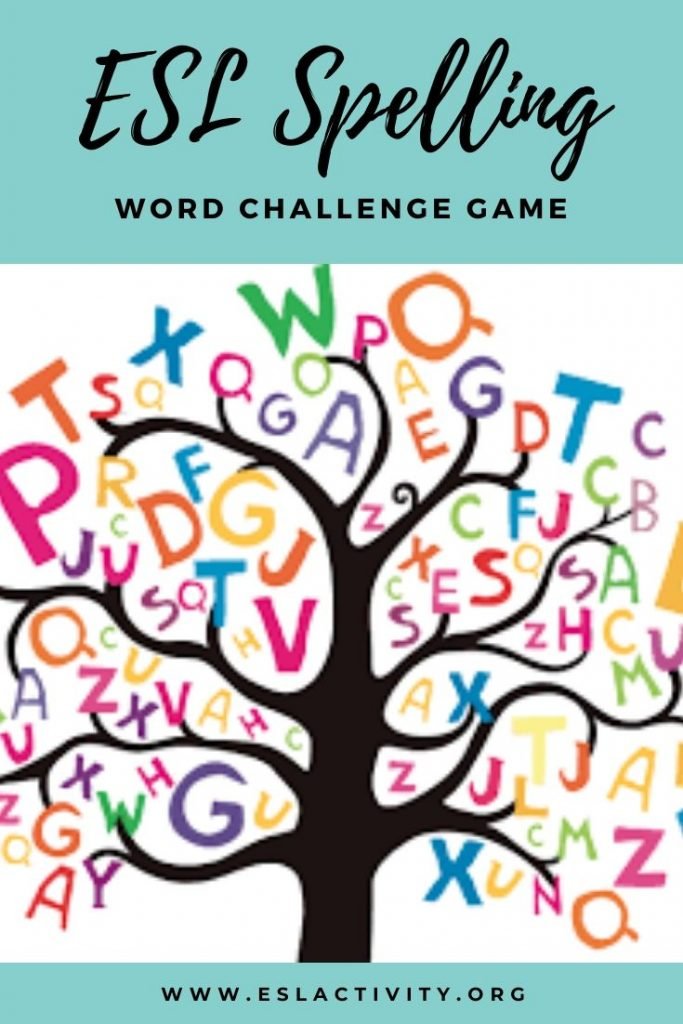
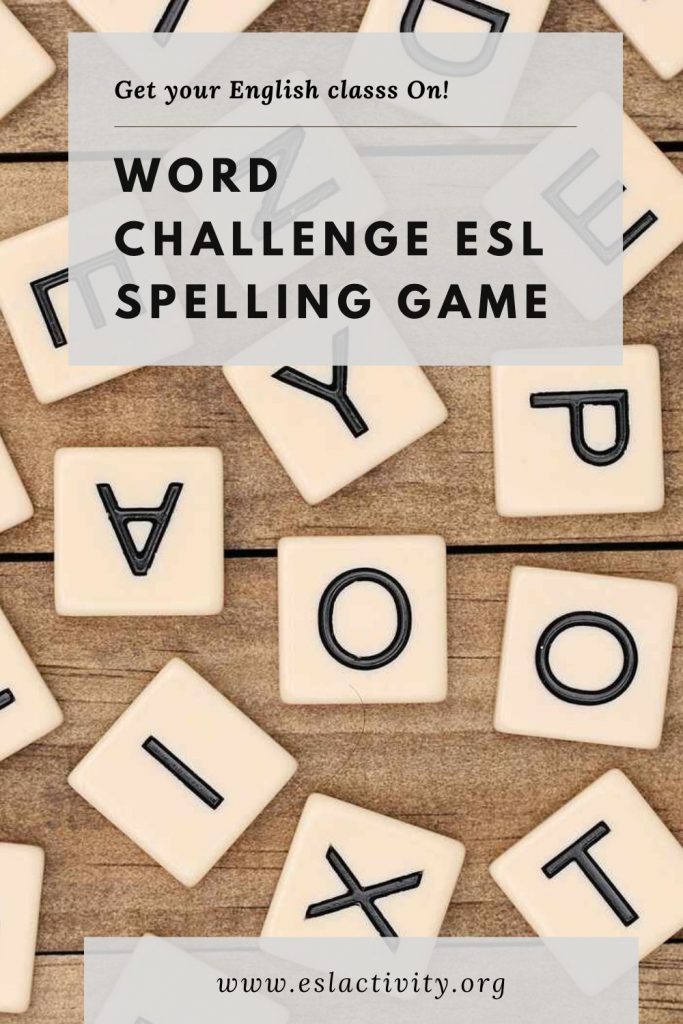
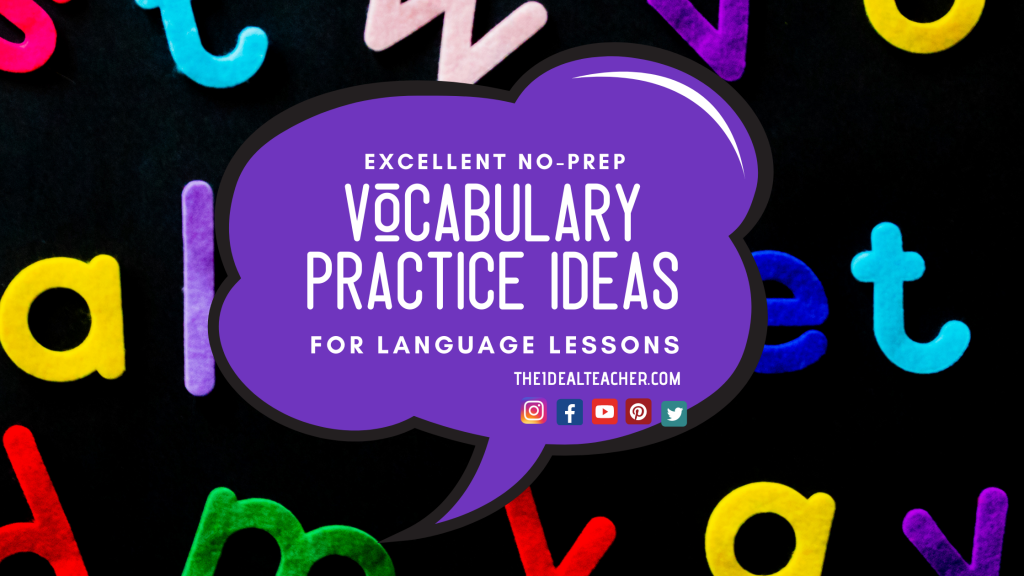 Brilliant Activities To Practise Vocabulary in Language Lessons
Brilliant Activities To Practise Vocabulary in Language Lessons 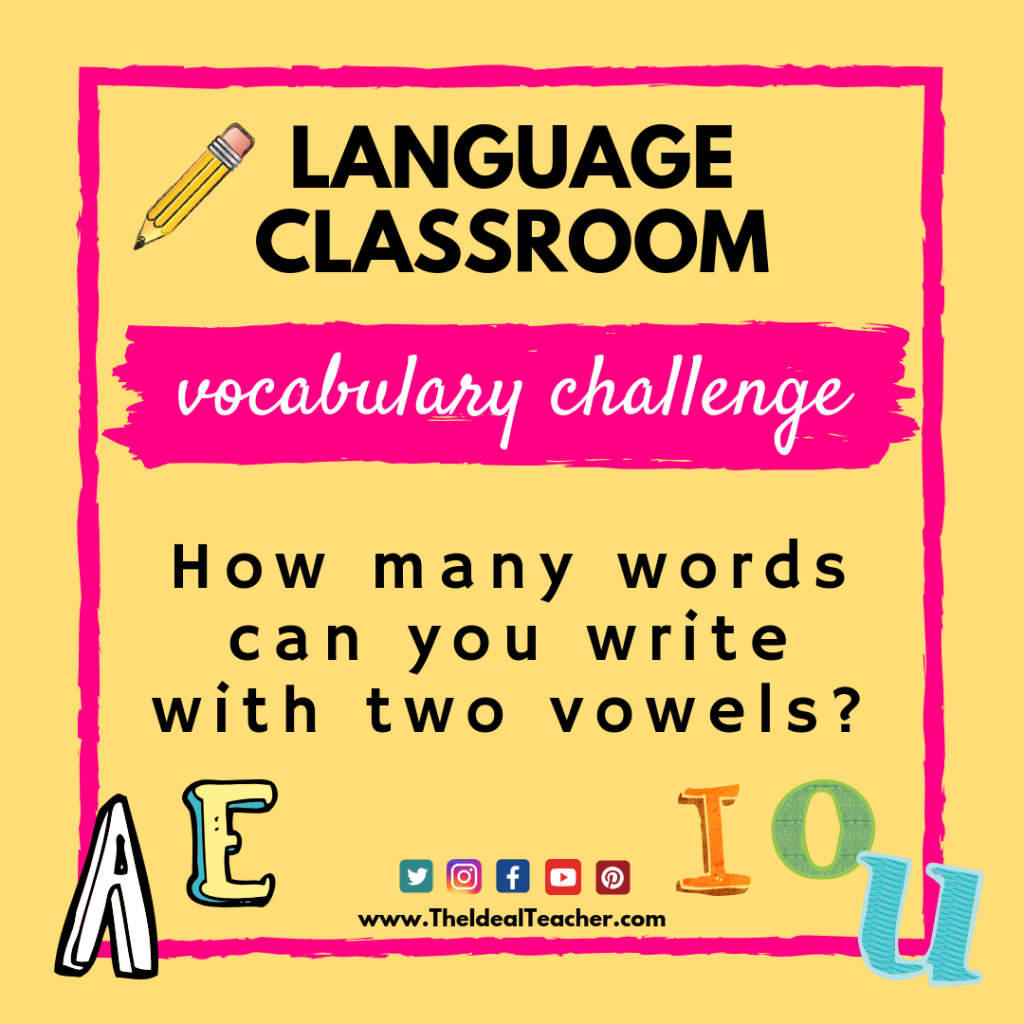
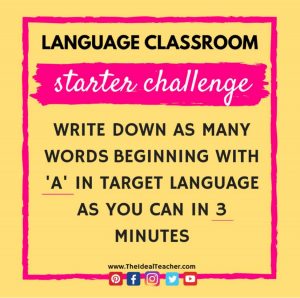
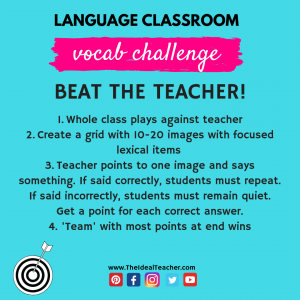
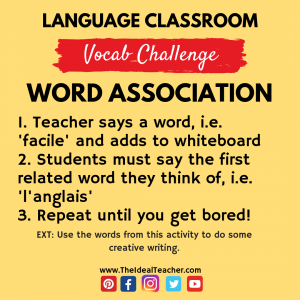
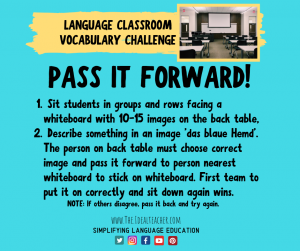 I do love a good vocabulary activity with a competitive element! This one’s got both of these combined.
I do love a good vocabulary activity with a competitive element! This one’s got both of these combined.